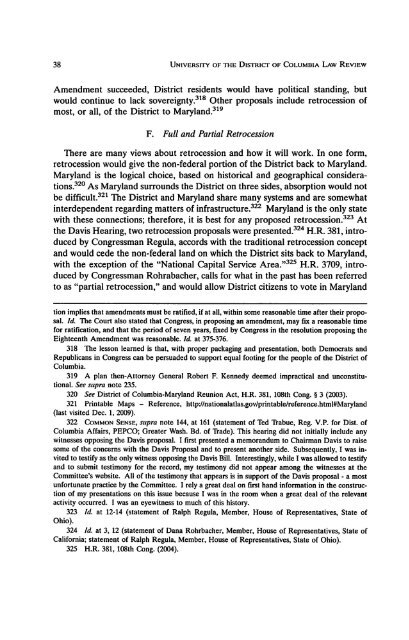Download - UDC Law Review
Download - UDC Law Review
Download - UDC Law Review
Create successful ePaper yourself
Turn your PDF publications into a flip-book with our unique Google optimized e-Paper software.
38 UNIVERSITY OF THE DISTRICf OF COLUMBIA LAW REVIEWAmendment succeeded, District residents would have political standing, butwould continue to lack sovereignty.318 Other proposals include retrocession ofmost, or all, of the District to Maryland. 319F. Full and Partial RetrocessionThere are many views about retrocession and how it will work. In one form,retrocession would give the non-federal portion of the District back to Maryland.Maryland is the logical choice, based on historical and geographical considerations,320As Maryland surrounds the District on three sides, absorption would notbe difficult. 321 The District and Maryland share many systems and are somewhatinterdependent regarding matters of infrastructure. 322 Maryland is the only statewith these connections; therefore, it is best for any proposed retrocession. 323 Atthe Davis Hearing, two retrocession proposals were presented. 324 H.R. 381, introducedby Congressman Regula, accords with the traditional retrocession conceptand would cede the non-federal land on which the District sits back to Maryland,with the exception of the "National Capital Service Area.,,325 H.R. 3709, introducedby Congressman Rohrabacher, calls for what in the past has been referredto as "partial retrocession," and would allow District citizens to vote in Marylandtion implies that amendments must be ratified, if at all, within some reasonable time after their proposal.[d. The Court also stated that Congress, in proposing an amendment, may fIx a reasonable timefor ratifIcation, and that the period of seven years, fIxed by Congress in the resolution proposing theEighteenth Amendment was reasonable. [d. at 375-376.318 The lesson learned is that, with proper packaging and presentation, both Democrats andRepUblicans in Congress can be persuaded to support equal footing for the people of the District ofColumbia.319 A plan then-Attorney General Robert F. Kennedy deemed impractical and unconstitutional.See supra note 235.320 See District of Columbia-Maryland Reunion Act, H.R. 381, 108th Congo § 3 (2003).321 Printable Maps - Reference, http://nationalatlas.gov/printable/reference.html#Maryland(last visited Dec. 1, 2009).322 COMMON SENSE, supra note 144, at 161 (statement of Ted Trabue, Reg. V.P. for Dist. ofColumbia Affairs, PEPCO; Greater Wash. Bd. of Trade). This hearing did not initially include anywitnesses opposing the Davis proposal. I fIrst presented a memorandum to Chairman Davis to raisesome of the concerns with the Davis Proposal and to present another side. Subsequently, I was invitedto testify as the only witness opposing the Davis Bill. Interestingly, while I was allowed to testifyand to submit testimony for the record, my testimony did not appear among the witnesses at theCommittee's website. AU of the testimony that appears is in support of the Davis proposal- a mostunfortunate practice by the Committee. I rely a great deal on first hand information in the constructionof my presentations on this issue because I was in the room when a great deal of the relevantactivity occurred. I was an eyewitness to much of this history.323 [d. at 12-14 (statement of Ralph Regula, Member, House of Representatives, State ofOhio).324 [d. at 3, 12 (statement of Dana Rohrbacher, Member, House of Representatives, State ofCalifornia; statement of Ralph Regula, Member, House of Representatives, State of Ohio).325 H.R. 381, 108th Cong. (2004).














